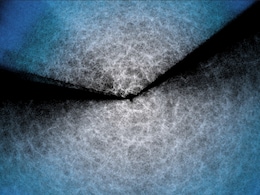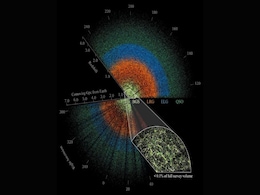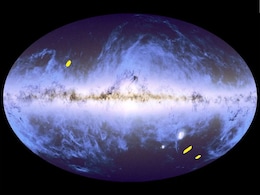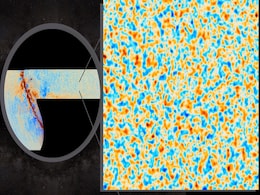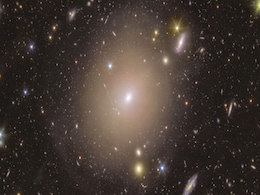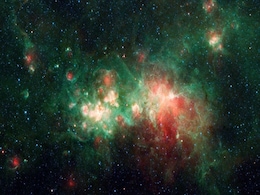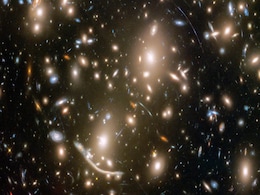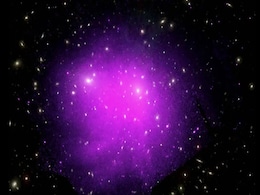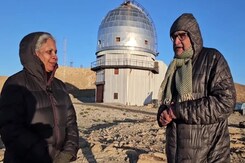Dark Universe
- All
- News
- Videos
- Web Stories
-

Dark Energy May Not Be Constant - How This Discovery Can Change Science
- Friday April 4, 2025
- World News | The Conversation
The great Russian physicist and Nobel laureate Lev Landau once remarked that "cosmologists are often in error, but never in doubt". In studying the history of the universe itself, there is always a chance that we have got it all wrong.
-
 www.ndtv.com
www.ndtv.com
-

Did Black Hole Radiation Shape the Universe?
- Saturday March 29, 2025
- Written by Gadgets 360 Staff
A study suggests that Hawking radiation, first proposed by Stephen Hawking, may have influenced the universe’s structure. According to reports, primordial black holes that existed in the early universe could have evaporated through Hawking radiation, impacting matter distribution. The research explores how these black holes might have shaped gala...
-
 www.gadgets360.com
www.gadgets360.com
-

New Research Suggests Dark Energy Is Evolving, Challenging Cosmology Models
- Wednesday March 26, 2025
- Written by Gadgets 360 Staff
New research from the DESI project suggests that dark energy, once thought to be a constant force, may actually be changing over time. This challenges long-held cosmological models that assume a stable influence of dark energy on the universe’s expansion. By mapping 15 million galaxies, DESI’s data raises new questions about cosmic evolution. S...
-
 www.gadgets360.com
www.gadgets360.com
-

ESA’s Euclid Telescope Releases First Data, Mapping 26 Million Galaxies
- Wednesday March 26, 2025
- Written by Gadgets 360 Staff
ESA’s Euclid telescope has released its first dataset, mapping 26 million galaxies within a week. The observations include deep-field images, a survey of 380,000 galaxies, and 500 new gravitational lens candidates. Scientists will continue tracking cosmic evolution over six years. The dataset, currently 35 terabytes, is expected to grow to 2 peta...
-
 www.gadgets360.com
www.gadgets360.com
-

What Is Dark Energy? The Mystery Behind The Expanding Universe
- Thursday March 20, 2025
- World News | Agence France-Presse
Dark energy makes up roughly 70 percent of the universe, yet we know nothing about it. Around 25 percent of the universe is the equally mysterious dark matter, leaving just five percent for everything that we can see and touch.
-
 www.ndtv.com
www.ndtv.com
-

Europe's 'Dark Universe Detective' Telescope, Launched In 2023, Releases 1st Data
- Wednesday March 19, 2025
- World News | Agence France-Presse
The telescope launched in 2023, aiming to chart one third of the sky -- encompassing 1.5 billion galaxies -- to create what has been billed as humanity's most accurate 3D map of the universe.
-
 www.ndtv.com
www.ndtv.com
-

Atacama Telescope Reveals Most Detailed Cosmic Microwave Background Yet
- Thursday March 20, 2025
- Written by Gadgets 360 Staff
New images from the decommissioned Atacama Cosmology Telescope offer the most detailed view of the cosmic microwave background. The data reveals early cosmic structures, tracks primordial gas movement, and refines estimates of the universe’s total mass. While supporting existing models, it does not resolve the Hubble tension. Researchers are now ...
-
 www.gadgets360.com
www.gadgets360.com
-

Black Hole Hunter Priyamvada Natarajan Searches For The Unseen Universe
- Monday February 24, 2025
- Science | Reported by Pallava Bagla, Edited by Aastha Ahuja
Black holes are a place in the universe where gravity is so intense that not even light can escape.
-
 www.ndtv.com
www.ndtv.com
-

Frontier Supercomputer Simulates Universe with Unmatched Complexity
- Tuesday February 18, 2025
- Written by Gadgets 360 Staff
The Frontier supercomputer at Oak Ridge National Laboratory has conducted the most detailed universe simulation to date. Using the Hardware/Hybrid Accelerated Cosmology Code (HACC) under the U.S. Department of Energy’s Exascale Computing Project, the model incorporates dark matter, gas, and plasma interactions. With speeds reaching 1.4 exaFLOPS, ...
-
 www.gadgets360.com
www.gadgets360.com
-

Euclid Space Telescope Discovers Rare Einstein Ring, Revealing Dark Matter Secrets
- Wednesday February 12, 2025
- Written by Gadgets 360 Staff
The Euclid space telescope has detected a rare Einstein ring around galaxy NGC 6505, located approximately 590 million light-years from Earth. This phenomenon, resulting from gravitational lensing, allows scientists to study the distribution of dark matter within the lensing galaxy. The discovery aligns with Euclid's mission to map cosmic structure...
-
 www.gadgets360.com
www.gadgets360.com
-

New Cosmic Surveys Reveal Unexpected Clues About Universe’s Evolution
- Monday February 3, 2025
- Written by Gadgets 360 Staff
A new study published in the Journal of Cosmology and Astroparticle Physics reveals a potential discrepancy in the expected clumpiness of cosmic structures. Researchers from the University of Pennsylvania and Lawrence Berkeley National Laboratory analysed data from the Atacama Cosmology Telescope (ACT) and the Dark Energy Spectroscopic Instrument (...
-
 www.gadgets360.com
www.gadgets360.com
-

Scientists Discover Hidden Clues to the Dark Universe in 3D Galaxy Maps
- Thursday January 30, 2025
- Written by Gadgets 360 Staff
A breakthrough study has revealed new insights into the "dark universe," which consists of dark matter and dark energy. By using a novel technique called field-level inference (FLI), scientists have discovered previously hidden details in 3D galaxy maps. This method preserves the three-dimensional nature of the data, unlike traditional compression ...
-
 www.gadgets360.com
www.gadgets360.com
-

Vera C. Rubin Observatory to Detect Millions of Exploding Stars
- Wednesday January 29, 2025
- Written by Gadgets 360 Staff
The Vera C. Rubin Observatory, set to begin its 10-year Legacy Survey of Space and Time (LSST) later this year, will track millions of Type Ia supernovae to advance our understanding of dark energy. These supernovae, resulting from white dwarf stars in binary systems, will be studied in detail to provide crucial data on the universe’s acceleratin...
-
 www.gadgets360.com
www.gadgets360.com
-

Dark Matter Mass Limits Linked to Higgs Boson Interactions
- Wednesday January 29, 2025
- Written by Gadgets 360 Staff
Efforts to unravel dark matter's mysteries have revealed a potential mass limitation due to its interaction with the Higgs boson. A new study suggests that dark matter particles exceeding a few thousand giga-electron volts (GeV) could disrupt the Higgs boson, altering fundamental physical laws. This finding challenges the Standard Model and prompts...
-
 www.gadgets360.com
www.gadgets360.com
-

Coma Cluster’s Distance Closer Than Predicted, Amplifying Hubble Tension Crisis
- Friday January 24, 2025
- Written by Gadgets 360 Staff
A new study led by Dan Scolnic and Adam Riess reveals that the Coma Cluster is 38 million light-years closer than predicted by standard cosmological models, intensifying the ongoing Hubble tension. This discrepancy, involving measurements of type Ia supernova explosions, challenges the universe's expansion rate as predicted by the Hubble–Lemaîtr...
-
 www.gadgets360.com
www.gadgets360.com
-

Dark Energy May Not Be Constant - How This Discovery Can Change Science
- Friday April 4, 2025
- World News | The Conversation
The great Russian physicist and Nobel laureate Lev Landau once remarked that "cosmologists are often in error, but never in doubt". In studying the history of the universe itself, there is always a chance that we have got it all wrong.
-
 www.ndtv.com
www.ndtv.com
-

Did Black Hole Radiation Shape the Universe?
- Saturday March 29, 2025
- Written by Gadgets 360 Staff
A study suggests that Hawking radiation, first proposed by Stephen Hawking, may have influenced the universe’s structure. According to reports, primordial black holes that existed in the early universe could have evaporated through Hawking radiation, impacting matter distribution. The research explores how these black holes might have shaped gala...
-
 www.gadgets360.com
www.gadgets360.com
-

New Research Suggests Dark Energy Is Evolving, Challenging Cosmology Models
- Wednesday March 26, 2025
- Written by Gadgets 360 Staff
New research from the DESI project suggests that dark energy, once thought to be a constant force, may actually be changing over time. This challenges long-held cosmological models that assume a stable influence of dark energy on the universe’s expansion. By mapping 15 million galaxies, DESI’s data raises new questions about cosmic evolution. S...
-
 www.gadgets360.com
www.gadgets360.com
-

ESA’s Euclid Telescope Releases First Data, Mapping 26 Million Galaxies
- Wednesday March 26, 2025
- Written by Gadgets 360 Staff
ESA’s Euclid telescope has released its first dataset, mapping 26 million galaxies within a week. The observations include deep-field images, a survey of 380,000 galaxies, and 500 new gravitational lens candidates. Scientists will continue tracking cosmic evolution over six years. The dataset, currently 35 terabytes, is expected to grow to 2 peta...
-
 www.gadgets360.com
www.gadgets360.com
-

What Is Dark Energy? The Mystery Behind The Expanding Universe
- Thursday March 20, 2025
- World News | Agence France-Presse
Dark energy makes up roughly 70 percent of the universe, yet we know nothing about it. Around 25 percent of the universe is the equally mysterious dark matter, leaving just five percent for everything that we can see and touch.
-
 www.ndtv.com
www.ndtv.com
-

Europe's 'Dark Universe Detective' Telescope, Launched In 2023, Releases 1st Data
- Wednesday March 19, 2025
- World News | Agence France-Presse
The telescope launched in 2023, aiming to chart one third of the sky -- encompassing 1.5 billion galaxies -- to create what has been billed as humanity's most accurate 3D map of the universe.
-
 www.ndtv.com
www.ndtv.com
-

Atacama Telescope Reveals Most Detailed Cosmic Microwave Background Yet
- Thursday March 20, 2025
- Written by Gadgets 360 Staff
New images from the decommissioned Atacama Cosmology Telescope offer the most detailed view of the cosmic microwave background. The data reveals early cosmic structures, tracks primordial gas movement, and refines estimates of the universe’s total mass. While supporting existing models, it does not resolve the Hubble tension. Researchers are now ...
-
 www.gadgets360.com
www.gadgets360.com
-

Black Hole Hunter Priyamvada Natarajan Searches For The Unseen Universe
- Monday February 24, 2025
- Science | Reported by Pallava Bagla, Edited by Aastha Ahuja
Black holes are a place in the universe where gravity is so intense that not even light can escape.
-
 www.ndtv.com
www.ndtv.com
-

Frontier Supercomputer Simulates Universe with Unmatched Complexity
- Tuesday February 18, 2025
- Written by Gadgets 360 Staff
The Frontier supercomputer at Oak Ridge National Laboratory has conducted the most detailed universe simulation to date. Using the Hardware/Hybrid Accelerated Cosmology Code (HACC) under the U.S. Department of Energy’s Exascale Computing Project, the model incorporates dark matter, gas, and plasma interactions. With speeds reaching 1.4 exaFLOPS, ...
-
 www.gadgets360.com
www.gadgets360.com
-

Euclid Space Telescope Discovers Rare Einstein Ring, Revealing Dark Matter Secrets
- Wednesday February 12, 2025
- Written by Gadgets 360 Staff
The Euclid space telescope has detected a rare Einstein ring around galaxy NGC 6505, located approximately 590 million light-years from Earth. This phenomenon, resulting from gravitational lensing, allows scientists to study the distribution of dark matter within the lensing galaxy. The discovery aligns with Euclid's mission to map cosmic structure...
-
 www.gadgets360.com
www.gadgets360.com
-

New Cosmic Surveys Reveal Unexpected Clues About Universe’s Evolution
- Monday February 3, 2025
- Written by Gadgets 360 Staff
A new study published in the Journal of Cosmology and Astroparticle Physics reveals a potential discrepancy in the expected clumpiness of cosmic structures. Researchers from the University of Pennsylvania and Lawrence Berkeley National Laboratory analysed data from the Atacama Cosmology Telescope (ACT) and the Dark Energy Spectroscopic Instrument (...
-
 www.gadgets360.com
www.gadgets360.com
-

Scientists Discover Hidden Clues to the Dark Universe in 3D Galaxy Maps
- Thursday January 30, 2025
- Written by Gadgets 360 Staff
A breakthrough study has revealed new insights into the "dark universe," which consists of dark matter and dark energy. By using a novel technique called field-level inference (FLI), scientists have discovered previously hidden details in 3D galaxy maps. This method preserves the three-dimensional nature of the data, unlike traditional compression ...
-
 www.gadgets360.com
www.gadgets360.com
-

Vera C. Rubin Observatory to Detect Millions of Exploding Stars
- Wednesday January 29, 2025
- Written by Gadgets 360 Staff
The Vera C. Rubin Observatory, set to begin its 10-year Legacy Survey of Space and Time (LSST) later this year, will track millions of Type Ia supernovae to advance our understanding of dark energy. These supernovae, resulting from white dwarf stars in binary systems, will be studied in detail to provide crucial data on the universe’s acceleratin...
-
 www.gadgets360.com
www.gadgets360.com
-

Dark Matter Mass Limits Linked to Higgs Boson Interactions
- Wednesday January 29, 2025
- Written by Gadgets 360 Staff
Efforts to unravel dark matter's mysteries have revealed a potential mass limitation due to its interaction with the Higgs boson. A new study suggests that dark matter particles exceeding a few thousand giga-electron volts (GeV) could disrupt the Higgs boson, altering fundamental physical laws. This finding challenges the Standard Model and prompts...
-
 www.gadgets360.com
www.gadgets360.com
-

Coma Cluster’s Distance Closer Than Predicted, Amplifying Hubble Tension Crisis
- Friday January 24, 2025
- Written by Gadgets 360 Staff
A new study led by Dan Scolnic and Adam Riess reveals that the Coma Cluster is 38 million light-years closer than predicted by standard cosmological models, intensifying the ongoing Hubble tension. This discrepancy, involving measurements of type Ia supernova explosions, challenges the universe's expansion rate as predicted by the Hubble–Lemaîtr...
-
 www.gadgets360.com
www.gadgets360.com

